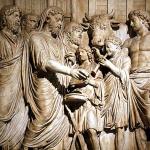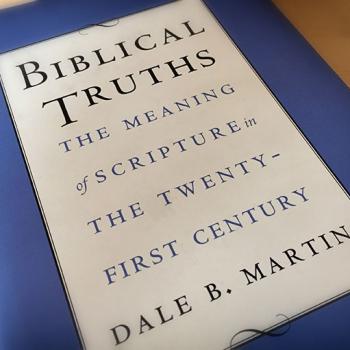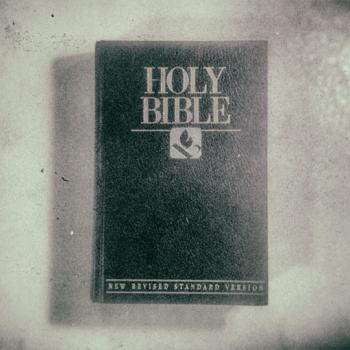 If you have even a passing interest in jewelry making or holiday decor, then you’re probably familiar with Hobby Lobby. And if you have even a passing interest in biblical manuscripts or the modern antiquities market, then you’re probably familiar with the Green family, who just so happen to own Hobby Lobby.
If you have even a passing interest in jewelry making or holiday decor, then you’re probably familiar with Hobby Lobby. And if you have even a passing interest in biblical manuscripts or the modern antiquities market, then you’re probably familiar with the Green family, who just so happen to own Hobby Lobby.
The Greens possess both strong business acumen and steadfast evangelical Christian faith, and it is the meeting of those two seemingly disparate fields that is explored in the new book Bible Nation: The United States of Hobby Lobby by Candida Moss and Joel Baden. Their timely and eye-opening book is “an exploration of the unusual intersection of faith and business, biblical worldview and academic scholarship, religion and the public sphere–all of which are brought together in the Bible-focused initiatives of the Green family, Hobby Lobby, and MOTB [Museum of the Bible]” (12).
Moss and Baden examine the establishment of the vast antiquities collection of the Green family, the scholarly study (or lack thereof) of that collection, the Bible curriculum that the Greens are promoting for use in public schools, and the Museum of the Bible, a Green initiative dedicated to the book they seem intent to promote at virtually any cost.
In describing and explaining how the Greens are seeking to bring their “biblical” worldview to America, Moss and Baden raise difficult questions and cast light on countless questionable decisions surrounding the various Green-sponsored endeavors. But this book isn’t simply an exposé, it is a reasoned and methodical attempt to “understand their motivations, explain their beliefs, and describe the ways that this small but powerful family is reshaping how the Bible is understood by the public” (21).
Through interviews with the Greens and their associates, it seems that the Green family means well. Theirs is a naïve and simplistic faith in which the Bible “is a source of unmitigated good … The book itself is blameless, and is responsible for many of the cultural values we hold dear” (129). More often than not, the shortcoming (and there are many) in their various Bible-related projects can be chalked up to “well-intentioned self-deception and large-scale naïveté” (185).
Though Moss and Baden take pains throughout the book to objectively explore all sides of these stories and generally withhold judgment about the facts they uncover, their final assessment is damning. They conclude that the Greens have:
“ended up misleading their constituents and stakeholders at virtually every level. They have promoted a Protestant Bible curriculum in the guise of secular education. They have created a museum that speaks the language of religious pluralism but that in fact rehearses the standard Protestant story of the Bible. They have taken advantage of undergraduate and graduate students, offering the promise of important scholarly work; but often the only benefit for students has been a bolstering of their own faith commitments, without any professional advancement or formation. They have misled the evangelical community, by suggesting the potential for amazing new discoveries, remarkably early biblical texts, only to retract those claims or burying those artifacts out of sight. They have misled the scholarly community by offering access but then denying intellectual control, and by promising full disclosure but then maintaining near-complete secrecy about their holdings. And they have misled the public at large by promoting a curriculum and a museum that tell only the story that the Greens want to tell, without acknowledging that scholars and experts have spent decades, indeed centuries, laboring to provide very different accounts of the Bible and its history.” (185)
Maybe, like several people I’ve spoken to about this book, none of that matters to you. Maybe you don’t care that a family who is “among the most influential and powerful Christians in the United States” (21) is trying to foist their particular worldview on America.
Maybe you don’t care that illicit purchases of antiquities often fund terrorism.
Maybe you don’t care that a multi-million dollar museum in Washington, D.C., just a stone’s throw from the Smithsonian, though claiming to be non-sectarian, is essentially designed to proselytize for conservative Christianity.
Maybe you don’t care that countless invaluable ancient manuscripts are being withheld from proper academic study.
Maybe you don’t care that the Greens’ Bible curriculum, though “billed as education is, in fact, subtle religious indoctrination” (182).
I personally care deeply about those things and think the Greens’ business-driven promotion of their idiosyncratic understanding of the Bible and Christianity is profoundly troubling. Though I’m generally not one for boycotts, it’s clear that Hobby Lobby isn’t simply a benign purveyor of baubles and trinkets and that shopping there implicitly endorses the Greens’ agenda. The next time I need a cheap picture frame or some fake flowers, I’ll be taking my business elsewhere.
Find out more about Bible Nation: The United States of Hobby Lobby and read the introduction to the book here.
 Dan Wilkinson
Dan Wilkinson
Dan is the Executive Editor of the Unfundamentalist Christians blog. He is a writer, graphic designer and IT specialist. He lives in Montana, is married and cares for two cats.
We want to know what you think about the upcoming midterm elections. Vote in our poll below.












